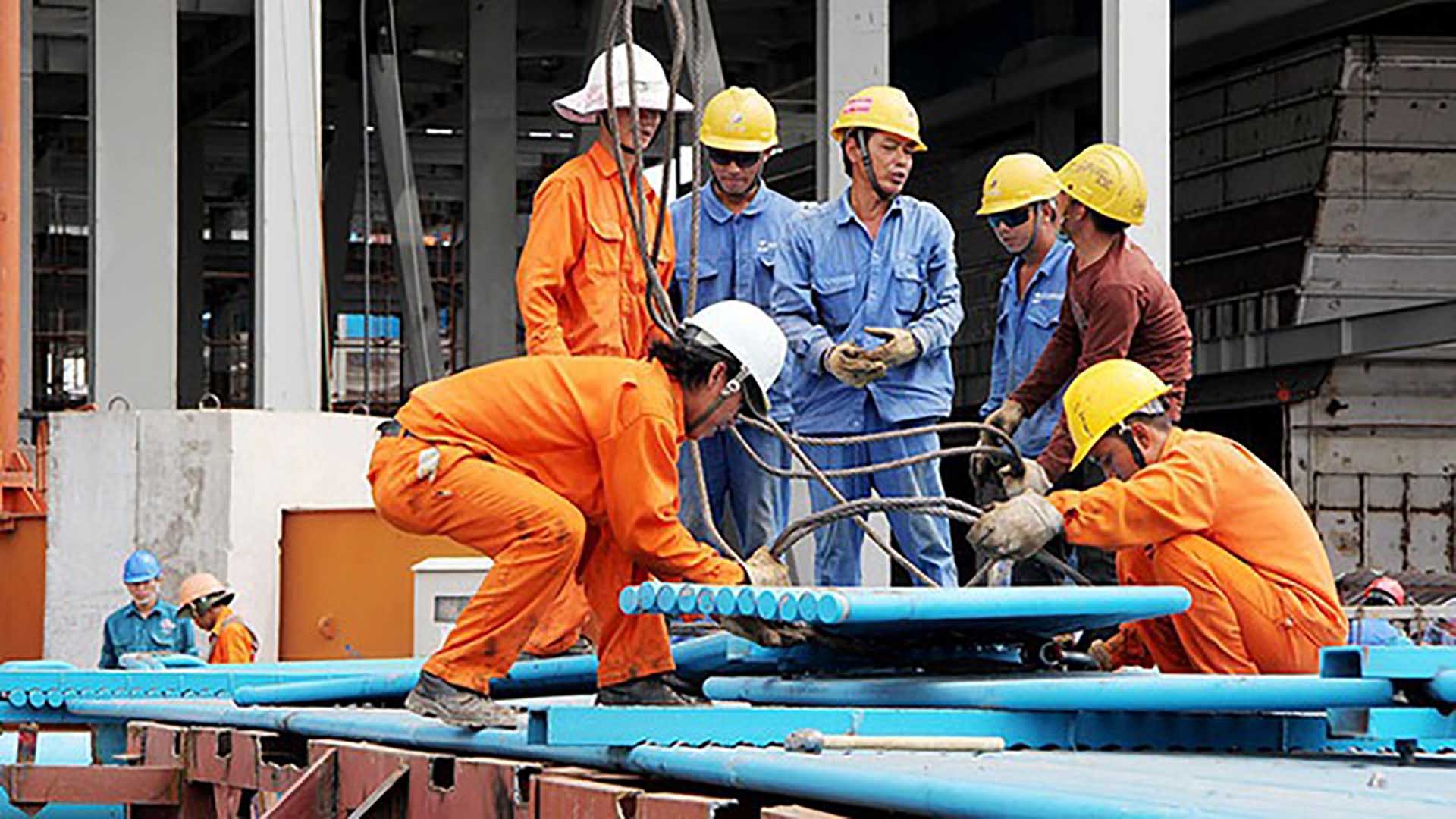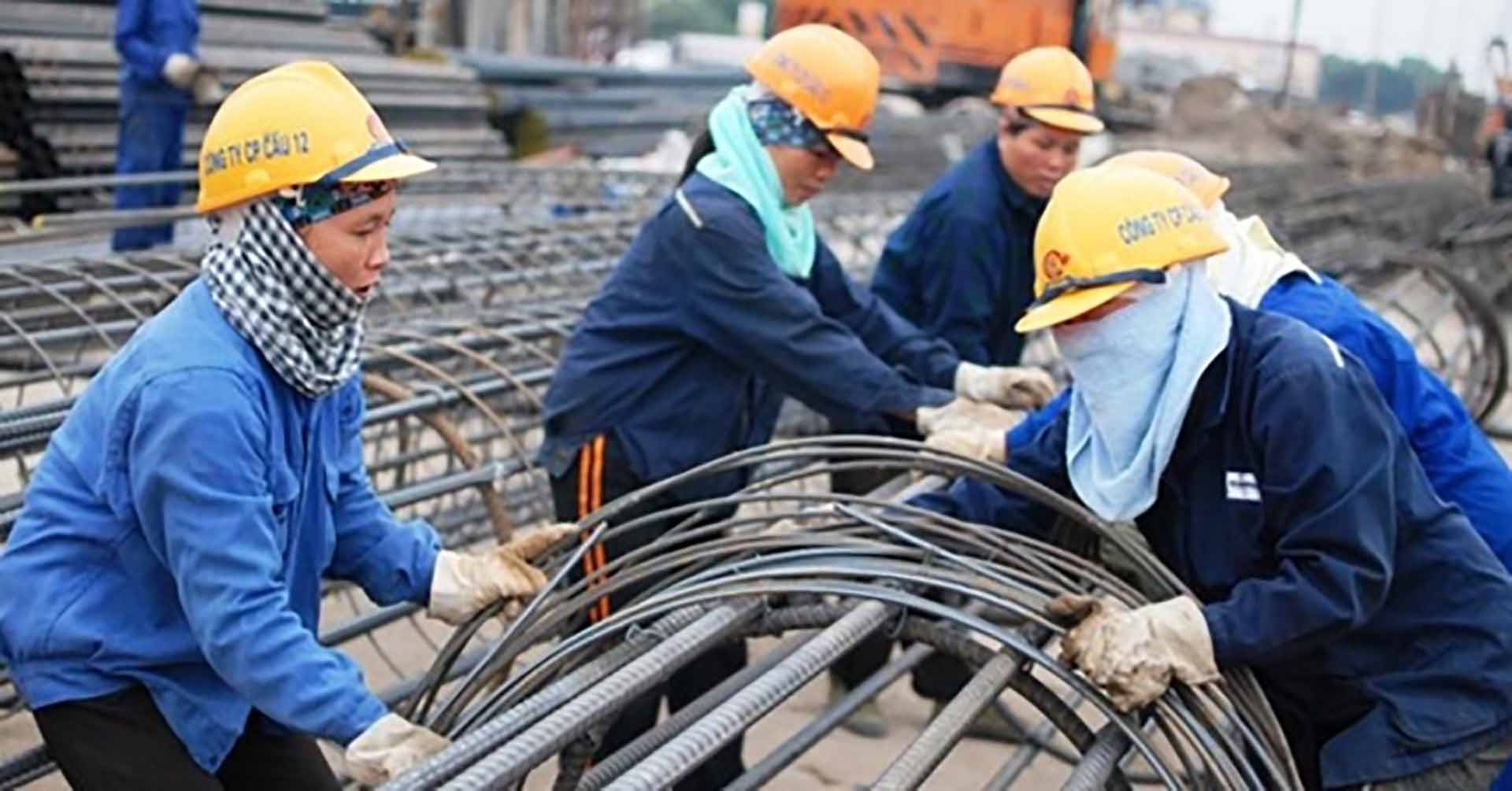
Protecting workers' health: Toward a safe production environment
Latest
Recently, the Party Central Committee issued Directive 31-CT/TW to continue enhancing the Party's leadership in labor safety and hygiene in the new situation, building on the achievements of the past 10 years following Directive 29-CT/TW to promote labor safety and hygiene during the period of industrialization, modernization, and international integration.
 |
| The 2024 Occupational Safety and Health Action Month will focus on various activities. (Photo: VGP) |
Achievements reached
One of the most notable achievements over the past 10 years following Directive No. 29-CT/TW—a particularly important directive in the field of occupational safety and hygiene—has been a fundamental shift in awareness, mindset, and responsibility among ministries, central agencies, local governments, enterprises, and workers concerning occupational safety and hygiene.
The Ministry of Labor, Invalids and Social Affairs reports that the legal framework on occupational safety and hygiene has been progressively refined, aligning with international regulations and conventions that Vietnam has joined.
The National Assembly has passed two codes and two laws related to occupational safety and hygiene, including the Law on Occupational Safety and Hygiene in 2015. This law fundamentally changed the approach by prioritizing prevention and also extended its coverage to workers not in employment relationships.
From 2013 to 2023, the government issued 17 decrees (including 8 related to occupational safety in specific fields), and ministries issued 135 circulars (including 30 related to occupational safety in specific fields).
Local governments have issued resolutions and decisions and numerous directives, urging and organizing the implementation of policies and legislation on occupational safety and hygiene appropriate to practical conditions.
According to reports from central ministries and agencies, over the past 10 years, approximately 50,000 news articles, sessions on disseminating and promoting the law on occupational safety and hygiene have been held. The Vietnam General Confederation of Labor has printed and distributed 51,438,143 flyers, banners, slogans, posters, and propaganda posters; 33,500 safety and hygiene handbooks to workers; and 59,826 newsletters, features, forums, seminars, interviews, and news articles on occupational safety and hygiene.
On average, each year, central ministries and agencies organize over 10,000 classes on occupational safety and hygiene training, and the Departments of Labor, Invalids, and Social Affairs in provinces and cities organize over 46,000 such training classes for millions of workers not in employment relationships.
Over the past 10 years, various levels of trade unions have organized 191,481 training sessions for 12,977,110 workers. Since 2013, at the central level, training on occupational safety and hygiene has been conducted for about 20,000 people working in heavy, toxic, and dangerous jobs, and for those involved in occupational safety and hygiene in agricultural production and rural industries.
From 2013 to 2023, more than 2,000 research topics and applications of science and technology in occupational safety and hygiene were deployed at central ministries and agencies; over 266,000 topics were deployed within the system of the Vietnam General Confederation of Labor; nearly 3,000 topics were deployed at local levels. Some topics adopted modern approaches that align with new management philosophies in occupational safety and hygiene.
The inspection and examination of occupational safety and hygiene have been a focus from the central to local government levels. Over the past 10 years, there have been more than 51,000 inspection and examination sessions along with over 313,000 recommendations concerning occupational safety and hygiene.
The state management of occupational safety and hygiene has seen significant changes. Inspection, supervision, and examination activities are regularly coordinated among ministries, agencies, and localities. Training and enhancing understanding and skills to prevent accidents and occupational diseases, ensuring safety and hygiene for workers have received significant attention. Central and local agencies have been proactive in enhancing cooperation and exchanging safety and hygiene expertise with many countries and international organizations.
Occupational safety is a broad field, not only concerning the working conditions of workers but also involving material savings, regular health check-ups, and the prevention of risks related to accidents and occupational diseases, ensuring proper management of workers' records from the start...
Compared to 2022, the situation of occupational accidents in 2023 decreased in some key indicators: fatal occupational accidents decreased by 8.06% (662 cases, down by 58), a 7.29% decrease in deaths (699 people, down by 50); accidents decreased by 4.2% (324 cases); and a 4.7% decrease in the number of people injured in occupational accidents (down by 370 people).
In 2023, insurance resolved 7,326 cases of workers involved in occupational accidents, occupational diseases, and traffic accidents entitled to occupational accident benefits. This included 2,190 monthly cases and 5,136 one-time cases. Approximately over 5 million people were trained in occupational safety and hygiene, and over 3.5 million pieces of equipment were technically inspected for occupational safety.
Inspection and examination activities for occupational safety and hygiene have been intensified. Organizations have been actively advising on improving safety and hygiene conditions for enterprises and households, contributing to raising awareness and consciousness among workers.
| The 13th National Congress of the Vietnam Trade Unions identified one of the three breakthrough areas as enhancing dialogue and collective bargaining, with a focus on wages, bonuses, working hours, rest times, and occupational safety and hygiene. |
Strengthening occupational safety and hygiene in the new situation
Despite important results achieved, there are still existing limitations and challenges: Some party committees, organizations, local governments, and enterprises do not yet see occupational safety and hygiene as a central task in their socio-economic development plans; resources allocated for occupational safety and hygiene activities have not yet met practical needs; and the awareness and compliance with occupational safety and hygiene laws among many workers are still subjective and negligent…
Ms. Chu Thi Hanh, Deputy Director General of the Occupational Safety Agency, Ministry of Labor, War Invalids, and Social Affairs, pointed out some remaining issues such as the high levels and concerning rates of occupational accidents, occupational diseases, and serious incidents.
In 2023, across the country, there were 7,394 occupational accidents affecting 7,553 victims, including 1,720 seriously injured; 662 fatal accidents resulted in 699 deaths. The total cost for occupational accidents and property damage was approximately 16,357 billion VND and more than 149,770 lost working days, calculated only within the sector with employment relationships.
 |
| The inspection and examination of occupational safety and hygiene have been a focus from the central to local government levels. (Photo: daidoanket.vn) |
Additionally, aiming to promote industrialization, modernization, and the development of science and technology, including the digital economy, circular economy, and green growth, especially amid the fourth industrial revolution, the efforts in occupational safety and hygiene need to grasp technological change opportunities but also proactively refine mechanisms, policies, and laws on occupational safety and hygiene, keeping them updated according to international conventions, treaties, and standards; enhancing training and improving the quality of the workforce with industrial working styles, discipline, and modern industry consciousness, while also focusing on health care for workers to adapt to changes in new circumstances.
In response to the requirements to continue promoting comprehensive renewal and international integration, awakening the aspiration for a prosperous and happy country as inspired by the Resolution of the XIII Congress of the Party; with the determination to improve working conditions, control occupational accidents and diseases; protecting the human resources aimed at a safe, high-productivity production environment across the entire supply chain, contributing to the successful implementation of the Party's resolutions, Directive No. 31 dated March 19, 2024, from the Party Central Committee set goals: reduce the rate of fatal occupational accidents by at least 4%; increase the detection of occupational diseases in workers exposed to risk factors by at least 5%; increase the number of establishments detecting harmful elements and conducting environmental monitoring in the workplace by at least 5%.
| Directive No. 31 dated March 19, 2024, of the Party Central Committee on continuing to strengthen the Party's leadership over occupational safety and hygiene work in the new situation set the goals: reduce the rate of fatal occupational accidents by at least 4%; increase the detection of occupational diseases in workers exposed to risk factors by at least 5%; increase the number of establishments detecting harmful elements by at least 5%. |
To achieve the set goals, it is necessary to strengthen the leadership and direction of Party committees at all levels; continue to enhance the awareness of Party committees, party organizations, government, mass organizations about the role, significance, and importance of occupational safety and hygiene for the health and lives of workers and the socio-economic development, stability, and international integration; perfect the legal system on occupational safety and hygiene in line with the market economy and socialist orientation; continue to innovate, improve the quality and effectiveness of state management over occupational safety and hygiene; enhance the quality of advisory units on occupational safety and hygiene at all levels and sectors; combine proactive prevention with the detection and strict handling of violations; strengthen leadership, direction, guidance, inspection, and supervision; responsibility of the leaders is a regular, long-term task of significant importance in socio-economic development, ensuring human security.
At the same time, it is necessary to carry out propaganda, dissemination, education, and renewal of legal information, diversify propaganda, attract the participation of enterprises, workers in the Occupational Safety and Hygiene Action Month and the Workers' Month annually; create conditions for workers in areas without employment relationships to access information to enhance their awareness, responsibility, proactive prevention.
Promoting the role of the Vietnam Fatherland Front, political-social organizations, and the press in advocating the building of a culture of occupational safety among members and unionists.
Enhancing activities for dialogue, negotiation on ensuring occupational safety and working conditions, contributing to the development of harmonious, progressive labor relations. Review, supplement, and perfect policies, laws, focusing on prevention policies, addressing risks related to occupational accidents, occupational diseases; rights and duties of workers, employers, and trade union organizations...
Creating consensus, with close coordination among ministries, sectors, localities, and enterprises, contributes to the effective implementation of state management of occupational safety and hygiene.
| In 2024, the Occupational Safety and Hygiene Action Month (May 1-31) was officially launched on April 26, along with the Workers' Month, under the theme “Strengthening the assurance of occupational safety and hygiene at the workplace and in the supply chain.” During the Occupational Safety and Hygiene Action Month, numerous activities took place at the central and local levels, such as the implementation of Directive 31-CT/TW by the Party Central Committee to continue strengthening the Party's leadership over occupational safety and hygiene, dialogue at the national council and provincial levels on occupational safety and hygiene, visiting victims of occupational accidents and diseases, organizing inspection and self-inspection activities at enterprises and labor use establishments... |













